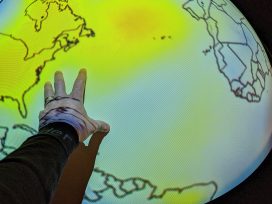
Since the collapse of Novi Sad’s train station in November, student-led protests have erupted across Serbia, inspiring a nationwide movement against corruption.
Can a sense of belonging exist that both encompasses nationhood and goes beyond it? Gary Younge, Susan Nieman and Jan Plamper look for a European identity that turns neoliberal ideology around.
The UK is already paying the price for dishonest campaigning during the referendum on EU membership. And yet misconceptions that dominated the Brexit Leave campaign are not only a UK phenomenon, argues Gary Younge. All European states struggle with immigration, multiculturalism, pluralism and inclusion, and the left falls short of counterbalancing the right’s manufactured notions of monoethnicity.
Why, then, don’t we fight harder in the name of solidarity? Since 1989, concepts such as ‘internationalism’ and ‘solidarity’ feel contaminated, says Susan Neiman: globalism has prevailed, but its universality is ultimately only the universality of needs.
The challenge, therefore, is how to create emotionally charged imaginaries which can fit together into a convincing European narrative, argues Jan Plamper.
Historian Emilia Salvanou, editor of Eurozine’s Greek partner Historein, moderated the panel featuring journalist and broadcaster Gary Younge, moral philosopher Susan Neiman and historian Jan Plamper at the Eurozine conference ‘Europe ’89: The promise recalled’, the 30th European Meeting of Cultural Journals (1-3 November 2019, Berlin).
Read the transcript of Gary Younge’s opening address here.
Find more videos and articles from the Eurozine conference ‘Europe ‘89: The promise recalled’, 1-3 November 2019, here.
Published 9 September 2020
Original in English
First published by Eurozine
© Gary Younge / Susan Neiman / Jan Plamper / Heinrich Böll Stiftung / Eurozine
PDF/PRINTSubscribe to know what’s worth thinking about.

Since the collapse of Novi Sad’s train station in November, student-led protests have erupted across Serbia, inspiring a nationwide movement against corruption.

Unlike the political challenges and wars of the past, the climate and environmental crisis we now face is universal. Yet green movements remain on the political periphery and continue to be viewed in narrow, reductionist terms. What kind of solidarity can unite the emerging ecological class?